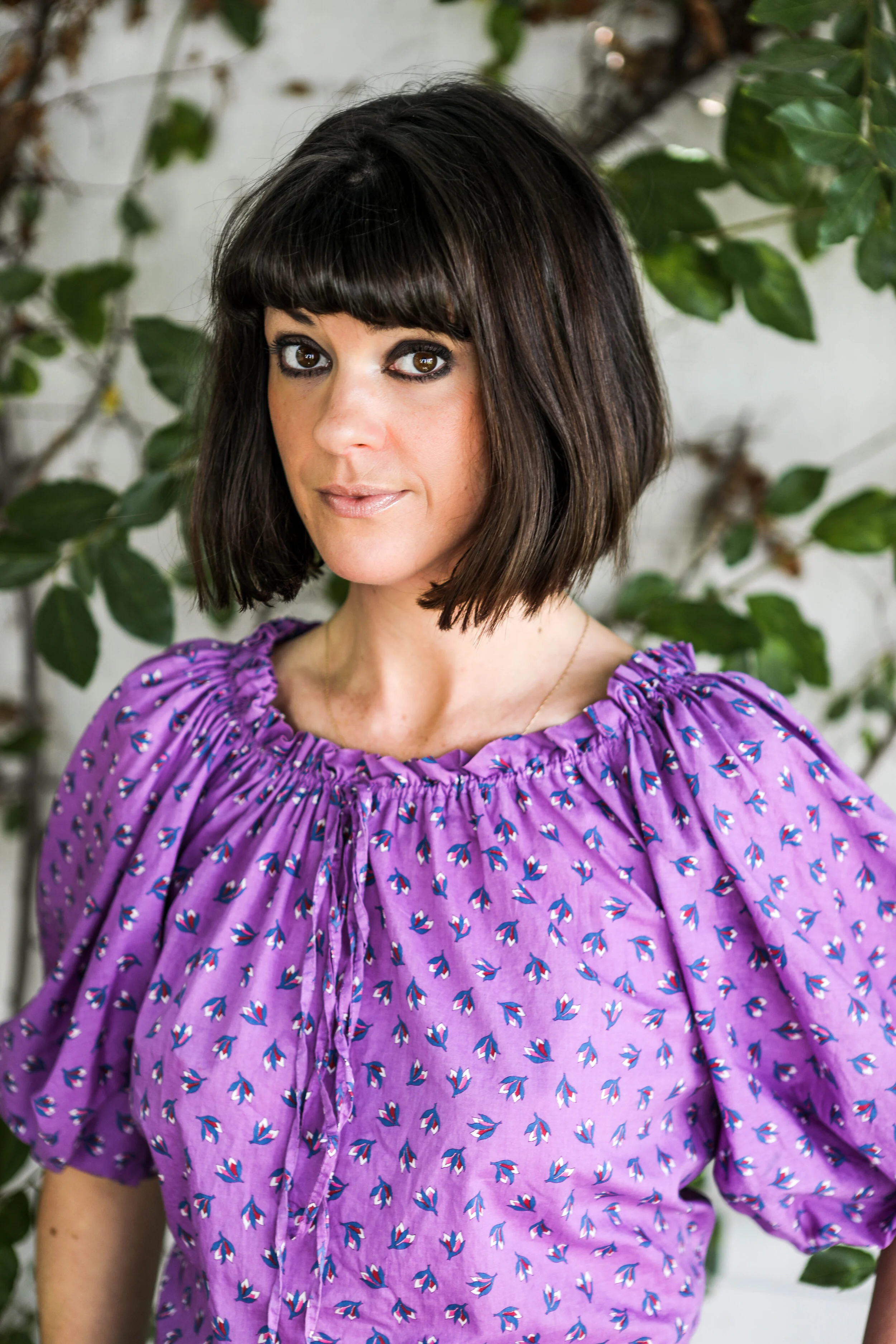Dawn O'Porter exclusive: ‘It’s important for all people to have their stories heard’
From television broadcaster to best-selling author, Dawn O’Porter certainly knows what makes a good story. Now, in our exclusive lockdown interview, it’s time to hear hers…
All Dawn O’Porter photography was captured and supplied by Hailey S Porter.
‘Wine.’ Dawn O’Porter is a parent to whom I can relate. At the time of our first conversation, we are four weeks into isolation and, though our locations differ dramatically, we each find shared solace in our freshly-poured glasses. O’Porter has battened down the hatches in sun-soaked Los Angeles, where she lives with her husband, Irish actor, Chris O’Dowd, and sons, Art, five, and Valentine, two. On the other hand, I type this from my garden on the coastal outskirts of Edinburgh under a devilishly darkening sky. Like all of us, however, O’Porter has had to adjust to a new way of living, and she sure as hell isn’t going to pretend it’s easy.
‘Wine,’ she quips when I ask her how she’s managing to maintain equilibrium in her household. ‘It’s a lot—this situation. Luckily, I like my husband and my kids. But no doubt about it—it’s intense. I can now make cupcakes, though, which is a revelation. So yes, there are good days, and there are bad days.’ This is what we’ve all come to love about her. She’s not trying to be relatable. She just is.
Having cut her teeth in the world of television, Dunbartonshire-born O’Porter has since turned her back on the camera. Instead, she has devoted herself to the life of the written word, though it appears her transition from presenting to prose was inevitable. ‘I’ve always told stories from when I was a tiny kid,’ she recalls. ‘I was a queen elaborator as a child. If I bumped my head on a table, I’d tell people I fell off a cliff—the kid who cried wolf. I was always trying to make things way more exciting than they were. As soon as I could write, I was writing fictional stories. My most famous one was “Nightmare on Albert Square,” where Dot Cotton and Ethel Skinner got into a situation with an alien. My sister framed it for me for my 40th. I was about eight when I wrote it—and it was the start of a long career.’
‘Be bold, don’t apologise for
what you want to do’
With seven books under her belt, O’Porter has a lot to say, and we’re thankful for that. Her most recognised works, the bestselling The Cows and So Lucky, both centre around the lives of different women, the things they believe to define them, and how those on the outset perceive them. These books demonstrate her innate ability to hone in on interesting stories to tell, where others mightn’t have seen the potential.
‘It starts with a tiny idea. A conversation. A news story. An article. Sometimes even a dream. I sit with it. If I can’t stop thinking about it, I know it’s worth pursuing. Sometimes a tiny moment sparks a whole book. All I’m looking for is to tap into people’s emotions—to do that, I have to trust my own. If something makes me feel deeply, then it will likely have the same effect on a reader. My job is to get it across to them in a way the real experience struck me. For example, I was sitting on a park bench once, when a man asked me to move so he could clean it with baby wipes. That moment inspired an entire novel. So Lucky was born off a tiny interaction buried in a million other interactions. But that one grabbed me by the heart, and I knew I had to build a story around it.’
So, does art ever imitate life? ‘Up until So Lucky, I called upon my own life a lot, but for this book, I went well beyond what I knew, and it was thrilling to write. It was the easiest book I have ever written because I wasn’t trying to portray a version of me. But I have lived a lot of life, and my own experiences will always be the backbone of what I do.’
Be it by way of documentaries, books, podcasts, or even musicals, O’Porter’s life-long love affair of weaving narratives has spanned just about every available medium. But television? Those days are long behind her. ‘They’re done,’ she affirms. ‘The long hours, the pressure, the scrutiny—I’m done. Now, I love having a career where I can drop my kids at school and pick them up again. Also, I love being in control of my life. I knew I always wanted to write. But I also had the annoying affliction of wanting to perform. Luckily age knocked that out of me. I want to be the one creating the stories; other people can bring them to life. I paid my dues in TV, I worked hard, but I felt, and was, so disposable. What it did give me was a profile which meant, when I started to write books, people knew about it. I’m eternally grateful for that. But this is where I want to be now. Alone with my computer, letting my brain do its thing.’
If her computer has become her sanctuary, then O’Porter’s Instagram is ours. Honest, open, and with we’ re-all-in-this-together inclusiveness, she’s built a platform for good from the ground up, even if she doesn’t realise it. ‘It’s a place I say stuff that will hopefully be funny,’ she says. ‘I don’t take it too seriously. I am not on it to change the world, so choose my activism carefully. I try to avoid conflict. I just want to have a laugh. I left Twitter because it’s so angry, and I started to feel like allowing so many strangers to have access to me, which was stupid. For me, Instagram is a nicer space.’ That said, it still comes with its fair share of aggression. But the trolls? They can’t fool O’Porter. ‘There will always be people who are pissed off and resent those they consider to have more. And it’s really easy to vent your anger to a handle rather than a real person. It’s all so boring—I’m so over it. Leaving Twitter was like breaking up with the worst boyfriend. My life is better because of it.’
‘There will always be people
who resent those they consider
to have more’
Sure, she may have upwards of 430k followers on Instagram, but O’Porter takes her status with a pinch of salt. ‘Of course, it’s nice to have that many people be interested in what I’m doing, but I am more interested in connecting with a smaller community on a meaningful level. I set up a Patreon blog to do that. I wanted somewhere to write, and I don’t see why writers should work for free. For a minimal fee, people can access a place where I write most days, and I share a lot more intimately than I would anywhere else. The paywall makes me feel very protected—no one is there to have a go at or argue with me, and I work really hard for the subscribers, and right now, there are around 2,500 of them. I think it’s the future. Too many artists give themselves away for free. For me, it’s not about big bucks or big audiences—it’s about a small, safe, and loyal crowd that wants to read what I have to say. On Instagram, all I try and do is make people laugh. And I think people appreciate the fact I’m not trying to tell them how to think, or what to believe.’
What was normal for the world three months ago is no longer a reality, and O’Porter is not exempt from this. As well as working overtime on her Patreon, she’s also had to change the way she works day-to-day. ‘Like so many others, I can no longer escape to my office. Before all of this, a typical day would have seen me go to work and write all day long. Then I’d come home, kick my shoes off, and put the dinner on, like all parents. The only difference is, I probably write a lot more notes while doing menial household tasks. I try to make the most of the little time my kids give me to focus. What I have realised is that I can’t take more than a month off writing. It’s like a medication that I need to survive.’
Once a male-dominated industry, storytelling, in all of its forms, is slowly providing more and more opportunities for female voices. While there’s undoubtedly still a long way to go, O’Porter implores anyone who has something to say to speak up. ‘I think it’s important for all people to have their stories heard. But for women, especially. When a woman writes openly about the female experience, she instils other women with confidence. I feel the same way for writers of colour or any minority. The only way the world will have compassion is for everyone to be able to tell their stories. Please, write. Write. Write. And write. Be bold, don’t feel intimidated, and don’t apologise for what you want to do.’



